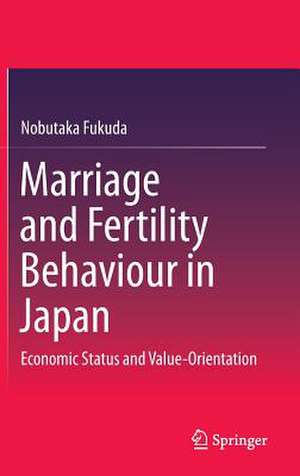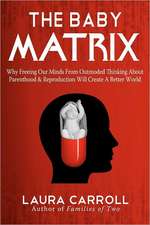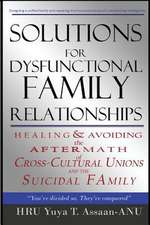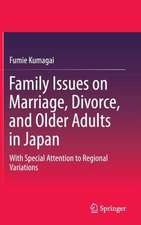Marriage and Fertility Behaviour in Japan: Economic Status and Value-Orientation
Autor Nobutaka Fukudaen Limba Engleză Hardback – 4 feb 2016
This monograph examines the influence of ideational and socio-economic factors on Japanese marriage and fertility behaviour. It also investigates the historical change in attitudes toward partnership and family in Japan, which, if current trends continue, can lead to population shrinkage and an asymmetrical age structure.
The author first details the differences between ideational and economic approaches. He examines these two behavioural models from a viewpoint of rational choice theory, which he then follows with a discussion on the influence of institutional contexts on matrimony and childbirth.
Next, the book considers salient features of Japanese marriage behaviour, including the relation between these patterns and changes in society and the influence of marriage on attitudes toward partnership and family relations. Coverage then goes on to explore the influence of ideational factors on fertility and analyse the impact of childbirth on couples' attitudes.
The author also investigates attitudinal changes between generations in Japan. He provides a theoretical review on the relation between socio-economic development and value-orientation as well as looks at the difference in attitudes from a viewpoint of cohorts and periods.
Overall, the book presents an authoritative, theoretical and empirical analysis using data from panel and repeated cross-sectional surveys. Throughout, the author clearly identifies the sources of his data as well as the methods used in his analysis.
| Toate formatele și edițiile | Preț | Express |
|---|---|---|
| Paperback (1) | 692.09 lei 43-57 zile | |
| Springer Nature Singapore – 31 mar 2018 | 692.09 lei 43-57 zile | |
| Hardback (1) | 698.30 lei 43-57 zile | |
| Springer Nature Singapore – 4 feb 2016 | 698.30 lei 43-57 zile |
Preț: 698.30 lei
Preț vechi: 821.53 lei
-15% Nou
Puncte Express: 1047
Preț estimativ în valută:
133.62€ • 139.86$ • 111.21£
133.62€ • 139.86$ • 111.21£
Carte tipărită la comandă
Livrare economică 31 martie-14 aprilie
Preluare comenzi: 021 569.72.76
Specificații
ISBN-13: 9789811002922
ISBN-10: 9811002924
Pagini: 183
Ilustrații: XIII, 183 p. 28 illus.
Dimensiuni: 155 x 235 x 13 mm
Greutate: 0.46 kg
Ediția:1st ed. 2016
Editura: Springer Nature Singapore
Colecția Springer
Locul publicării:Singapore, Singapore
ISBN-10: 9811002924
Pagini: 183
Ilustrații: XIII, 183 p. 28 illus.
Dimensiuni: 155 x 235 x 13 mm
Greutate: 0.46 kg
Ediția:1st ed. 2016
Editura: Springer Nature Singapore
Colecția Springer
Locul publicării:Singapore, Singapore
Public țintă
ResearchCuprins
Chapter 1: Introduction.- Chapter 2: Economic and Ideational Theories of Marriage and Fertility Behaviour.- Chapter 3: Economic Change, Value Shift and Marriage Behaviour.- Chapter 4: Economic Change, Value Shift and Fertility Behaviour.- Chapter 5: Stability and Change in Value-Orientations.- Chapter 6: Conclusion.
Notă biografică
Nobutaka Fukuda is a professor at Tohoku University, Japan, where he teaches Sociology and Social Statistics. He was a visiting researcher at the University of Oxford in 2000, the University of Chicago in 2012, and the University of California, Berkeley in 2014. After obtaining his BA in Economics and MA in Sociology of Education in Japan, he continued his research into Japanese Family at the University of Oxford. He received his doctorate from the University of Oxford, and writes many articles and books concerning Japanese family. He is one of the leading researchers on low fertility in Japan, and studies the relation between family formation and ideational change caused by socio-economic development. He is currently working on a comparative study of partnership, fertility, and intergenerational relations between Japan and other developed countries.
Textul de pe ultima copertă
This monograph examines the influence of ideational and socio-economic factors on Japanese marriage and fertility behaviour. It also investigates the historical change in attitudes toward partnership and family in Japan, which, if current trends continue, can lead to population shrinkage and an asymmetrical age structure.
The author first details the differences between ideational and economic approaches. He examines these two behavioural models from a viewpoint of rational choice theory, which he then follows with a discussion on the influence of institutional contexts on matrimony and childbirth.
Next, the book considers salient features of Japanese marriage behaviour, including the relation between these patterns and changes in society and the influence of marriage on attitudes toward partnership and family relations. Coverage then goes on to explore the influence of ideational factors on fertility and analyse the impact of childbirth on couples' attitudes.
The author also investigates attitudinal changes between generations in Japan. He provides a theoretical review on the relation between socio-economic development and value-orientation as well as looks at the difference in attitudes from a viewpoint of cohorts and periods.
Overall, the book presents an authoritative, theoretical and empirical analysis using data from panel and repeated cross-sectional surveys. Throughout, the author clearly identifies the sources of his data as well as the methods used in his analysis.
Caracteristici
Focuses on the influence of ideational and socio-economic changes on marriage and fertility in Japan Details characteristic attitudes toward partnership and family relations in Japan Considers the influence of value-orientation on marriage and fertility patterns in contemporary Japan Includes supplementary material: sn.pub/extras























